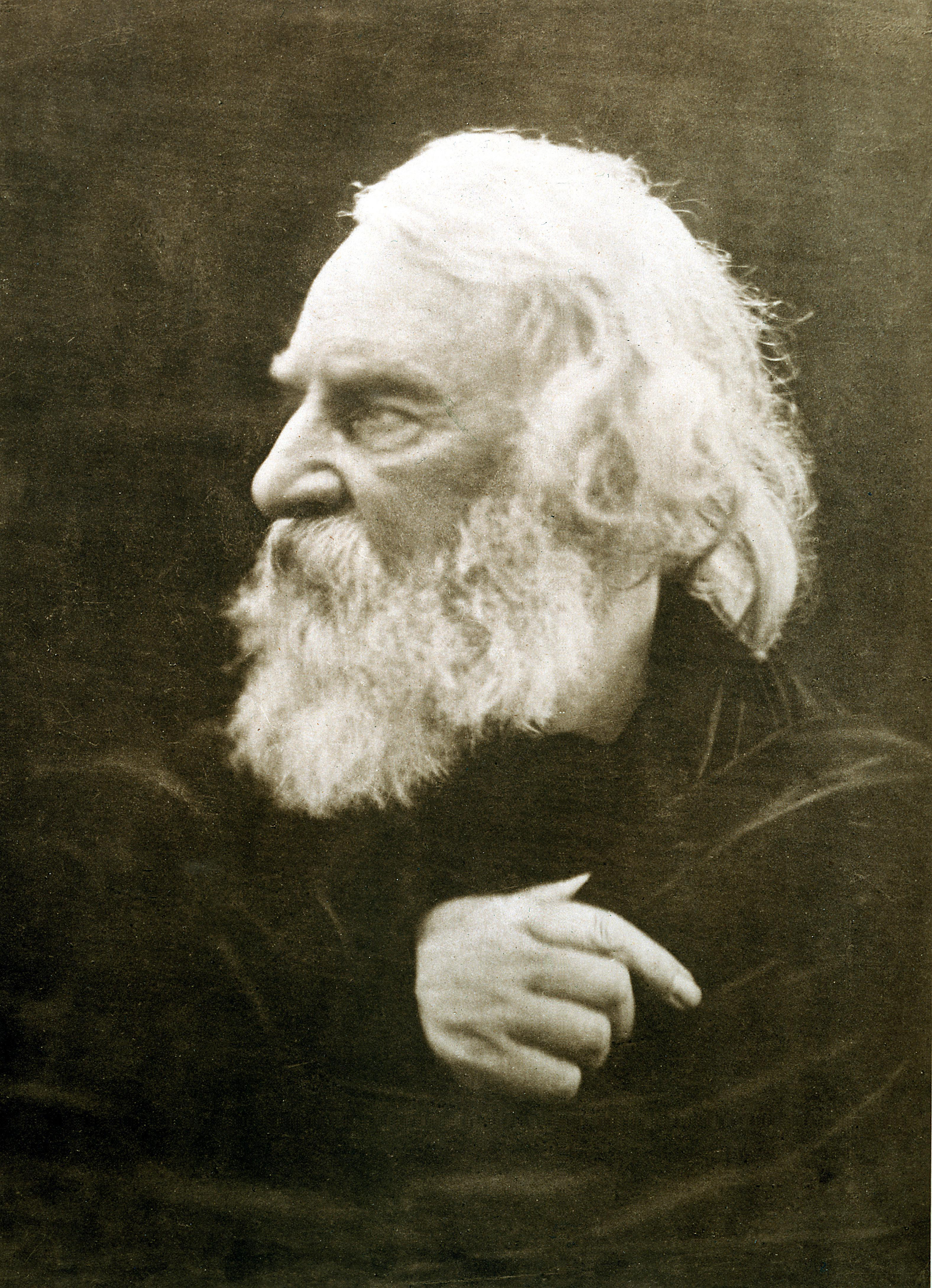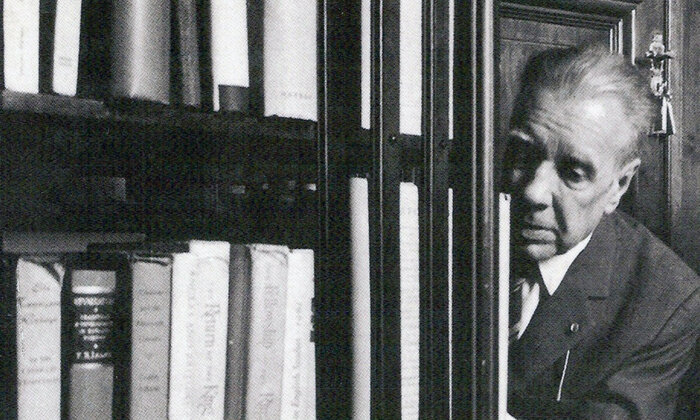Cynicism is easy. Mimicry is easy. Optimistic contrarians are the rarest breed.Naval Ravikant
28 February 2025
Optimistic.
Happy Birthday, Montaigne
Unknown, Michel de Montaigne, 1819
Man is certainly stark mad; he cannot make a worm, and yet he will be making gods by dozens.
Michel de Montaigne, born on this day in 1533
27 February 2025
Happy Birthday, Longfellow
Cameron, Longfellow, 1868
The BUILDING of the SHIP
"Build me straight, O worthy Master!
Stanch and strong, a goodly vessel,
That shall laugh at all disaster,
And with wave and whirlwind wrestle!"
The merchant's word
Delighted the Master heard;
For his heart was in his work, and the heart
Giveth grace unto every Art.
A quiet smile played round his lips,
As the eddies and dimples of the tide
Play round the bows of ships,
That steadily at anchor ride.
And with a voice that was full of glee,
He answered, "Erelong we will launch
A vessel as goodly, and strong, and stanch,
As ever weathered a wintry sea!"
And first with nicest skill and art,
Perfect and finished in every part,
A little model the Master wrought,
Which should be to the larger plan
What the child is to the man,
Its counterpart in miniature;
That with a hand more swift and sure
The greater labor might be brought
To answer to his inward thought.
And as he labored, his mind ran o'er
The various ships that were built of yore,
And above them all, and strangest of all
Towered the Great Harry, crank and tall,
Whose picture was hanging on the wall,
With bows and stern raised high in air,
And balconies hanging here and there,
And signal lanterns and flags afloat,
And eight round towers, like those that frown
From some old castle, looking down
Upon the drawbridge and the moat.
And he said with a smile, "Our ship, I wis,
Shall be of another form than this!"
It was of another form, indeed;
Built for freight, and yet for speed,
A beautiful and gallant craft;
Broad in the beam, that the stress of the blast,
Pressing down upon sail and mast,
Might not the sharp bows overwhelm;
Broad in the beam, but sloping aft
With graceful curve and slow degrees,
That she might be docile to the helm,
And that the currents of parted seas,
Closing behind, with mighty force,
Might aid and not impede her course.
In the ship-yard stood the Master,
With the model of the vessel,
That should laugh at all disaster,
And with wave and whirlwind wrestle!
Covering many a rood of ground,
Lay the timber piled around;
Timber of chestnut, and elm, and oak,
And scattered here and there, with these,
The knarred and crooked cedar knees;
Brought from regions far away,
From Pascagoula's sunny bay,
And the banks of the roaring Roanoke!
Ah! what a wondrous thing it is
To note how many wheels of toil
One thought, one word, can set in motion!
There 's not a ship that sails the ocean,
But every climate, every soil,
Must bring its tribute, great or small,
And help to build the wooden wall!
The sun was rising o'er the sea,
And long the level shadows lay,
As if they, too, the beams would be
Of some great, airy argosy,
Framed and launched in a single day.
That silent architect, the sun,
Had hewn and laid them every one,
Ere the work of man was yet begun.
Beside the Master, when he spoke,
A youth, against an anchor leaning,
Listened, to catch his slightest meaning.
Only the long waves, as they broke
In ripples on the pebbly beach,
Interrupted the old man's speech.
Beautiful they were, in sooth,
The old man and the fiery youth!
The old man, in whose busy brain
Many a ship that sailed the main
Was modelled o'er and o'er again; —
The fiery youth, who was to be
The heir of his dexterity,
The heir of his house, and his daughter's hand,
When he had built and launched from land
What the elder head had planned.
"Thus," said he, "will we build this ship!
Lay square the blocks upon the slip,
And follow well this plan of mine.
Choose the timbers with greatest care;
Of all that is unsound beware;
For only what is sound and strong
To this vessel shall belong.
Cedar of Maine and Georgia pine
Here together shall combine.
A goodly frame, and a goodly fame,
And the Union be her name!
For the day that gives her to the sea
Shall give my daughter unto thee!"
The Master's word
Enraptured the young man heard;
And as he turned his face aside,
With a look of joy and a thrill of pride
Standing before
Her father's door,
He saw the form of his promised bride.
The sun shone on her golden hair,
And her cheek was glowing fresh and fair,
With the breath of morn and the soft sea air.
Like a beauteous barge was she,
Still at rest on the sandy beach,
Just beyond the billow's reach;
But he
Was the restless, seething, stormy sea!
Ah, how skilful grows the hand
That obeyeth Love's command!
It is the heart, and not the brain,
That to the highest doth attain,
And he who followeth Love's behest
Far excelleth all the rest!
Thus with the rising of the sun
Was the noble task begun,
And soon throughout the ship-yard's bounds
Were heard the intermingled sounds
Of axes and of mallets, plied
With vigorous arms on every side;
Plied so deftly and so well,
That, ere the shadows of evening fell,
The keel of oak for a noble ship,
Scarfed and bolted, straight and strong,
Was lying ready, and stretched along
The blocks, well placed upon the slip.
Happy, thrice happy, every one
Who sees his labor well begun,
And not perplexed and multiplied,
By idly waiting for time and tide!
And when the hot, long day was o'er,
The young man at the Master's door
Sat with the maiden calm and still,
And within the porch, a little more
Removed beyond the evening chill,
The father sat, and told them tales
Of wrecks in the great September gales,
Of pirates coasting the Spanish Main,
And ships that never came back again,
The chance and change of a sailor's life,
Want and plenty, rest and strife,
His roving fancy, like the wind,
That nothing can stay and nothing can bind,
And the magic charm of foreign lands,
With shadows of palms, and shining sands,
Where the tumbling surf,
O'er the coral reefs of Madagascar,
Washes the feet of the swarthy Lascar,
As he lies alone and asleep on the turf.
And the trembling maiden held her breath
At the tales of that awful, pitiless sea,
With all its terror and mystery,
The dim, dark sea, so like unto Death,
That divides and yet unites mankind!
And whenever the old man paused, a gleam
From the bowl of his pipe would awhile illume
The silent group in the twilight gloom,
And thoughtful faces, as in a dream;
And for a moment one might mark
What had been hidden by the dark,
That the head of the maiden lay at rest,
Tenderly, on the young man's breast!
Day by day the vessel grew,
With timbers fashioned strong and true,
Stemson and keelson and sternson-knee,
Till, framed with perfect symmetry,
A skeleton ship rose up to view!
And around the bows and along the side
The heavy hammers and mallets plied,
Till after many a week, at length,
Wonderful for form and strength,
Sublime in its enormous bulk,
Loomed aloft the shadowy hulk!
And around it columns of smoke, upwreathing,
Rose from the boiling, bubbling, seething
Caldron, that glowed,
And overflowed
With the black tar, heated for the sheathing.
And amid the clamors
Of clattering hammers,
He who listened heard now and then
The song of the Master and his men: —
"Build me straight, O worthy Master,
Staunch and strong, a goodly vessel,
That shall laugh at all disaster,
And with wave and whirlwind wrestle!"
With oaken brace and copper band,
Lay the rudder on the sand,
That, like a thought, should have control
Over the movement of the whole;
And near it the anchor, whose giant hand
Would reach down and grapple with the land,
And immovable and fast
Hold the great ship against the bellowing blast!
And at the bows an image stood,
By a cunning artist carved in wood,
With robes of white, that far behind
Seemed to be fluttering in the wind.
It was not shaped in a classic mould,
Not like a Nymph or Goddess of old,
Or Naiad rising from the water,
But modelled from the Master's daughter!
On many a dreary and misty night,
'T will be seen by the rays of the signal light,
Speeding along through the rain and the dark,
Like a ghost in its snow-white sark,
The pilot of some phantom bark,
Guiding the vessel, in its flight,
By a path none other knows aright!
Behold, at last,
Each tall and tapering mast
Is swung into its place;
Shrouds and stays
Holding it firm and fast!
Long ago,
In the deer-haunted forests of Maine,
When upon mountain and plain
Lay the snow,
They fell, — those lordly pines!
Those grand, majestic pines!
'Mid shouts and cheers
The jaded steers,
Panting beneath the goad,
Dragged down the weary, winding road
Those captive kings so straight and tall,
To be shorn of their streaming hair,
And naked and bare,
To feel the stress and the strain
Of the wind and the reeling main,
Whose roar
Would remind them forevermore
Of their native forests they should not see again.
And everywhere
The slender, graceful spars
Poise aloft in the air,
And at the mast-head,
White, blue, and red,
A flag unrolls the stripes and stars.
Ah! when the wanderer, lonely, friendless,
In foreign harbors shall behold
That flag unrolled,
'T will be as a friendly hand
Stretched out from his native land,
Filling his heart with memories sweet and endless!
All is finished! and at length
Has come the bridal day
Of beauty and of strength.
To-day the vessel shall be launched!
With fleecy clouds the sky is blanched,
And o'er the bay,
Slowly, in all his splendors dight,
The great sun rises to behold the sight.
The ocean old,
Centuries old,
Strong as youth, and as uncontrolled,
Paces restless to and fro,
Up and down the sands of gold.
His beating heart is not at rest;
And far and wide,
With ceaseless flow,
His beard of snow
Heaves with the heaving of his breast.
He waits impatient for his bride.
There she stands,
With her foot upon the sands,
Decked with flags and streamers gay,
In honor of her marriage day,
Her snow-white signals fluttering, blending,
Round her like a veil descending,
Ready to be
The bride of the gray old sea.
On the deck another bride
Is standing by her lover's side.
Shadows from the flags and shrouds,
Like the shadows cast by clouds,
Broken by many a sunny fleck,
Fall around them on the deck.
The prayer is said,
The service read,
The joyous bridegroom bows his head;
And in tears the good old Master
Shakes the brown hand of his son,
Kisses his daughter's glowing cheek
In silence, for he cannot speak,
And ever faster
Down his own the tears begin to run.
The worthy pastor —
The shepherd of that wandering flock,
That has the ocean for its wold,
That has the vessel for its fold,
Leaping ever from rock to rock —
Spake, with accents mild and clear,
Words of warning, words of cheer,
But tedious to the bridegroom's ear.
He knew the chart
Of the sailor's heart,
All its pleasures and its griefs,
All its shallows and rocky reefs,
All those secret currents, that flow
With such resistless undertow,
And lift and drift, with terrible force,
The will from its moorings and its course.
Therefore he spake, and thus said he: —
"Like unto ships far off at sea,
Outward or homeward bound, are we.
Before, behind, and all around,
Floats and swings the horizon's bound,
Seems at its distant rim to rise
And climb the crystal wall of the skies,
And then again to turn and sink,
As if we could slide from its outer brink.
Ah! it is not the sea,
It is not the sea that sinks and shelves,
But ourselves
That rock and rise
With endless and uneasy motion,
Now touching the very skies,
Now sinking into the depths of ocean.
Ah! if our souls but poise and swing
Like the compass in its brazen ring,
Ever level and ever true
To the toil and the task we have to do,
We shall sail securely, and safely reach
The Fortunate Isles, on whose shining beach
The sights we see, and the sounds we hear,
Will be those of joy and not of fear!"
Then the Master,
With a gesture of command,
Waved his hand;
And at the word,
Loud and sudden there was heard,
All around them and below,
The sound of hammers, blow on blow,
Knocking away the shores and spurs.
And see! she stirs!
She starts, — she moves, — she seems to feel
The thrill of life along her keel,
And, spurning with her foot the ground,
With one exulting, joyous bound,
She leaps into the ocean's arms!
And lo! from the assembled crowd
There rose a shout, prolonged and loud,
That to the ocean seemed to say,
"Take her, O bridegroom, old and gray,
Take her to thy protecting arms,
With all her youth and all her charms!"
How beautiful she is! How fair
She lies within those arms, that press
Her form with many a soft caress
Of tenderness and watchful care!
Sail forth into the sea, O ship!
Through wind and wave, right onward steer!
The moistened eye, the trembling lip,
Are not the signs of doubt or fear.
Sail forth into the sea of life,
O gentle, loving, trusting wife,
And safe from all adversity
Upon the bosom of that sea
Thy comings and thy goings be!
For gentleness and love and trust
Prevail o'er angry wave and gust;
And in the wreck of noble lives
Something immortal still survives!
Thou, too, sail on, O Ship of State!
Sail on, O Union, strong and great!
Humanity with all its fears,
With all the hopes of future years,
Is hanging breathless on thy fate!
We know what Master laid thy keel,
What Workmen wrought thy ribs of steel,
Who made each mast, and sail, and rope,
What anvils rang, what hammers beat,
In what a forge and what a heat
Were shaped the anchors of thy hope!
Fear not each sudden sound and shock,
'T is of the wave and not the rock;
'T is but the flapping of the sail,
And not a rent made by the gale!
In spite of rock and tempest's roar,
In spite of false lights on the shore,
Sail on, nor fear to breast the sea!
Our hearts, our hopes, are all with thee,
Our hearts, our hopes, our prayers, our tears,
Our faith triumphant o'er our fears,
Are all with thee, — are all with thee!
Henry Wadsworth Longfellow, born on this day in 1807
Did.
Whenever the devil harasses you, seek the company of men or drink more, or joke and talk nonsense, or do some other merry thing. Sometimes we must drink more, sport, recreate ourselves, and even sin a little to spite the devil, so that we leave him no place for troubling our consciences with trifles. We are conquered if we try too conscientiously not to sin at all. So when the devil says to you: do not drink, answer him: I will drink, and right freely, just because you tell me not to.
Martin Luther, from "To Spite the Devil"
26 February 2025
25 February 2025
Re-Open.
How concrete everything becomes in the world of the spirit when an object, a mere door, can give images of hesitation, temptation, desire, security, welcome and respect. If one were to give an account of all the doors one has closed and opened, of all the doors one would like to re-open, one would have to tell the story of one's entire life.
Gaston Bachelard, from The Poetics of Space
Phenomenon.
Music, states of happiness, mythology, faces belabored by time, certain twilights, and certain places try to tell us something, or have said something we should not have missed, or are about to say something; this imminence of a revelation which does not occur is, perhaps, the aesthetic phenomenon.
Jorge Luis Borges, from The Wall and The Books
Released.
Bob Seger & The Silver Bullet Band released Against the Wind on this day in 1980.
The title track ...
Seems like yesterdayBut it was long ago
Happy Birthday, Renoir
Renoir, Femmes dans un Jardin, 1873
If you paint the leaf on a tree without using a model, your imagination will only supply you with a few leaves; but Nature offers you millions, all on the same tree. No two leaves are exactly the same. The artist who paints only what is in his mind must very soon repeat himself.
Pierre-Auguste Renoir, born on this day in 1841
24 February 2025
Ancient.
In your clay body,
things are coming to expression and to light
that were never known before,
presences that never came to light or shape
in any other individual.
To paraphrase Heidegger, who said,
"Man is a shepherd of being,"
we could say, "Man is a shepherd of clay."
You represent an unknown world
that begs you to bring it to voice.
Often the joy you feel
does not belong to your individual biography
but to the clay out of which you are formed.
At other times,
you will find sorrow moving through you,
like a dark mist over a landscape.
This sorrow is dark enough to paralyze you.
It is a mistake to interfere
with this movement of feeling.
It is more appropriate to recognize
that this emotion belongs more to your clay
than to your mind.
It is wise to let this weather of feeling pass;
it is on its way elsewhere.
We so easily forget that our clay
has a memory that preceded our minds,
a life of its own
before it took its present form.
Regardless of how modern we seem,
we still remain ancient,
sister and brothers of the one clay.
In each of us
a different part of the mystery
becomes luminous.
To truly be and become yourself,
you need the ancient radiance of others.
John O'Donohue
Happy Birthday, Homer
Homer, Hunter in the Adirondacks, 1892
You have the sky overhead giving one light; then the reflected light from whatever reflects; then the direct light of the sun; so that, in the blending and suffusing of these several luminations, there is no such thing as a line to be seen anywhere.
Winslow Homer, born on this day in 1836
23 February 2025
Happy Birthday, Handel
Mercier, Georg Friedrich Handel, 1730
George Frideric Handel was born on this day in 1685.
Giovanni Antonini conducts Il Giardino Armonico's performance of the Concerto Grosso in D-Major, Op. 6, No. 5, HWV 323 ...
22 February 2025
Emphasis.
Steve has McClay on the self, but I'd argue that much of our misery in this world is caused by our misplaced emphasis. Stop.
Happy Birthday, Millay
Oh, oh, you will be sorry for that word!
Give back my book and take my kiss instead.
Was it my enemy or my friend I heard,
“What a big book for such a little head!”
Come, I will show you now my newest hat,
And you may watch me purse my mouth and prink!
Oh, I shall love you still, and all of that.
I never again shall tell you what I think.
I shall be sweet and crafty, soft and sly;
You will not catch me reading any more:
I shall be called a wife to pattern by;
And some day when you knock and push the door,
Some sane day, not too bright and not too stormy,
I shall be gone, and you may whistle for me.
Edna St. Vincent Millay, born on this day in 1892
Fencing.
In Robert Frost’s poem "Mending Wall" two neighbours walk the shared boundaries of their properties, checking on the condition of the wall separating their land and making repairs where necessary. At one point the narrator teases his neighbour on the need for the wall, “My apple trees will never come across and eat the cones under his pines, I tell him”. The neighbour replies, simply and memorably, “Good fences make good neighbours”.Frost loves the phrase so much that it’s repeated again, to close the poem, and I’m reminded of this when looking at these two estate maps, of Down Manor from 1718 and Mowden Hall, 1762, both in Essex. Both are typical examples of an estate plan, are in manuscript form and show the holdings and field names of each estate (with sizes in acres, roods and perches). The connection with Frost comes with both showing boundaries in two different colours, according to ownership and according to responsibility of maintenance, to mark the outer boundaries of each estate. Any boundary dispute in the future would be easily settled with reference to the map. The importance of boundary fences are obvious, the need to keep animals out of certain fields and in others, as a way of separating good land from not so good and as a way of marking the limit of your land from your neighbour. The Down Manor map nicely calls the fencing surrounding the property "Out fencing."
Company.
Churchill, Bottlescape, 1926
Happy are the painters, for they shall not be lonely. Light and colour, peace and hope, will keep them
company to the end of the day.
Winston Churchill
Mozart, Sonata in A, K.331
Jonathan Delbridge plays the theme and variations on an 1814 Broadwood piano ...
Happy Birthday, Washington
Peale, Rembrandt, George Washington, 1795
Nothing can illustrate these observations more forcibly, than a recollection of the happy conjuncture of times and circumstances, under which our Republic assumed its rank among the Nations; The foundation of our Empire was not laid in the gloomy age of Ignorance and Superstition, but at an Epoch when the rights of mankind were better understood and more clearly defined, than at any former period, the researches of the human mind, after social happiness, have been carried to a great extent, the Treasures of knowledge, acquired by the labours of Philosophers, Sages and Legislatures, through a long succession of years, are laid open for our use, and their collected wisdom may be happily applied in the Establishment of our forms of Government; the free cultivation of Letters, the unbounded extension of Commerce, the progressive refinement of Manners, the growing liberality of sentiment... have had a meliorating influence on mankind and increased the blessings of Society. At this auspicious period, the United States came into existence as a Nation, and if their Citizens should not be completely free and happy, the fault will be entirely their own.
George Washington, born on this day in 1732, from "Circular to the States," 8 June 1783
21 February 2025
20 February 2025
Exists.
The terrifying immensity of the firmament’s abyss is an illusion, an external reflection of our own abysses, perceived “in a mirror.” We should invert our eyes and practice a sublime astronomy in the infinitude of our heart. If we see the Milky Way, it is because it actually exists in our souls.
Léon Bloy, translated by Jorge Luis Borges, from "The Mirrors of Enigma"
Introduced.
The world was introduced to The Smiths on this day in 1984.
Side One, Track One: "Reel Around the Fountain" ...
Timely.
There was this perception in him, which makes the poet or seer, an object of awe and terror, namely, that the same man, or society of men, may wear one aspect to themselves and their companions, and a different aspect to higher intelligences. Certain priests, whom he describes as conversing very learnedly together, appeared to the children, who were at some distance, like dead horses: and many the like misappearances. And instantly the mind inquires, whether these fishes under the bridge, yonder oxen in the pasture, those dogs in the yard, are immutably fishes, oxen, and dogs, or only so appear to me, and perchance to themselves appear upright men; and whether I appear as a man to all eyes. The Brahmins and Pythagoras propounded the same question, and if any poet has witnessed the transformation, he doubtless found it in harmony with various experiences. We have all seen changes as considerable in wheat and caterpillars. He is the poet, and shall draw us with love and terror, who sees, through the flowing vest, the firm nature, and can declare it.
I look in vain for the poet whom I describe. We do not, with sufficient plainness, or sufficient profoundness, address ourselves to life, nor dare we chant our own times and social circumstance. If we filled the day with bravery, we should not shrink from celebrating it. Time and nature yield us many gifts, but not yet the timely man, the new religion, the reconciler, whom all things await.
Ralph Waldo Emerson, from "The Poet"
Happy Birthday, Adams
Adams, Unicorn Peak, 1967
Simply look with perceptive eyes at the world about you, and trust to your own reactions and convictions. Ask yourself: "Does this subject move me to feel, think and dream?"
Ansel Adams, born on this day in 1902
17 February 2025
Limited.
Trumbull, George Washington and William Lee, 1780
When I was first honored with a call into the service of my country, then on the eve of an arduous struggle for its liberties, the light in which I contemplated my duty required that I should renounce every pecuniary compensation. From this resolution I have in no instance departed; and being still under the impressions which produced it, I must decline as inapplicable to myself any share in the personal emoluments which may be indispensably included in a permanent provision for the executive department, and must accordingly pray that the pecuniary estimates for the station in which I am placed may during my continuance in it be limited to such actual expenditures as the public good may be thought to require.George Washington, from his first inaugural speech in 1789
Corelli, Sonata da Chiesa, Op.3, No. 7
Sarah Willis, horn, Tamás Velenczei, trumpet, and Jesper Busk Sørensen, euphonium, perform ...
Interest.
I think it’s so foolish for people to want to be happy. Happy is so momentary — you’re happy for an instant and then you start thinking again. Interest is the most important thing in life; happiness is temporary, but interest is continuous.
Georgia O’Keeffe
Subscribe to:
Comments (Atom)









































.jpg)














































































































































































